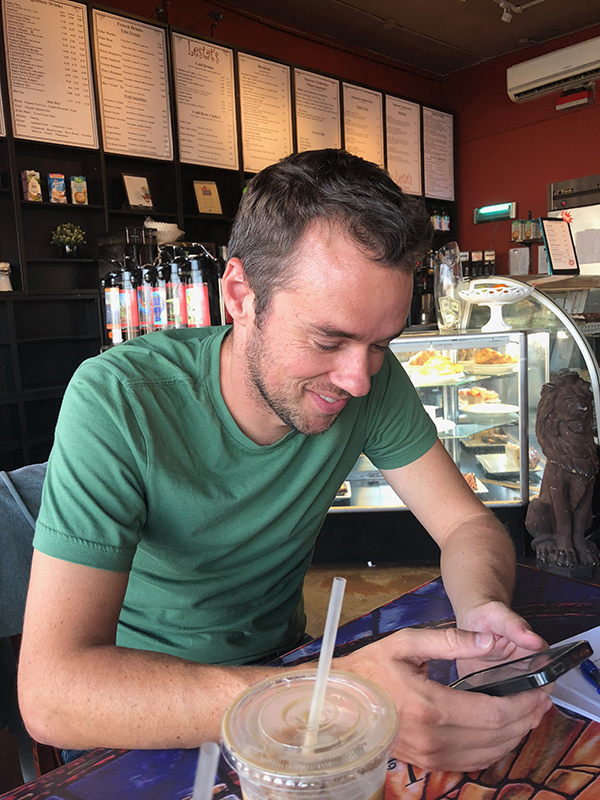
Lonely Hearts, Listen Up!
A sociologist gives advice about dating onlineBy Inga Kiderra
Online dating used to be rare. Now it has become the third most common way that couples meet. One in three heterosexual relationships and two in three same-sex relationships start online. If you’re trying your luck on a dating site or thinking about doing so, sociologist Kevin Lewis has three bits of advice for you.
Lewis majored in sociology and philosophy at UC San Diego with a minor in math, then went off to Harvard for grad school. He is now back at his undergrad alma mater as a sociology prof in the Division of Social Sciences, crunching big data to understand how society works. He studies social networks – both the age-old, in-person kind and today’s digital manifestations of them. He also studies online dating. And, yes, he’s dated online himself. Here’s what Lewis has to say about finding love the modern way:
No. 1 – Give it a go
Dating sites don’t have any idea what they’re doing. Your odds of being compatible with someone they recommend probably aren’t any different from your odds of being compatible with someone you meet offline. That said, there are a LOT of people online – many of whom you would never have met offline – so online dating is great if you feel like you’re not meeting enough people.
Dating online is particularly advantageous for people who are looking for a very specific trait, especially if it’s hard to identify who has that trait just by looking at them. It’s also helpful for people who are facing a “thin” romantic market offline. By that I mean anyone who has a hard time finding other people like them, whether this is people looking for same-sex partnership, people who are aging and single, or any other statistical minority.
Just remember to keep your expectations modest! Oh, and be honest! Distorting the truth may help land you a first date with someone, but it certainly won’t bring them back for a second.
No. 2 – Step up
To heterosexual women: I know online dating sucks. (It sucks for heterosexual men, too. But men, if you think you have it bad, try creating a false account as a woman for a while and see what that looks like.)
One thing that might help is initiating contact more often yourself. Men are way more likely to reply than you are, and it will give you a lot more choice in the process.
I get that this makes some women uncomfortable, it’s not very traditional, etc. So if traditional is what you’re looking for, continue to restrict yourself to the, um, “interesting” pool of people who contact you first. Every once in a while you might get lucky!
 No. 3 – Take a look in the mirror
No. 3 – Take a look in the mirror
This third piece is most important. One reason that online dating is so attractive and at times so disappointing is that it contributes to the notion that there is “someone for everyone” and all we have to do is find our “soulmate.” I do believe that there’s probably “someone for everyone,” but it’s also the case that some people are simply better potential partners than others.
My biggest piece of advice for anyone who is online dating (or dating of any kind) is to put at least as much work into self-improvement as you put into finding someone else.
Spending time on yourself will not only strengthen your partnership when you do find that person – it’ll help you better identify them – and it will make the loneliness you endure in the meantime not only more bearable, but potentially even pleasant and fulfilling.
If you’re intrigued about what else Kevin Lewis has to say – how “big data” is (and isn’t) changing what we know about human mate selection – the demographics of online dating – and whether relationships started online are any longer or happier, read on. Click on each question to see his response. Or you can “expand all” at once. Happy reading!
Why study online dating?
There are so many reasons! I’d say there are two big ones – one empirical and one “theoretical.” The empirical reason is simply the impact that online dating has had, and continues to have, on contemporary society. Online dating has becoming an integral part of the dating scene, and it’s impossible to understand modern romance without it.
The other reason, the theoretical one, is that online dating can potentially tell us a lot about mate choice that we didn’t know before. This is because, for the first time ever, we now have extremely fine-grained records of what the process of searching for and connecting with potential romantic partners looks like. In the same way that “big data” is revolutionizing other areas of social science, the availability of data from online dating sites has the potential to revolutionize our understanding of human mating.
Is "big data" changing what we know about dating and mate selection?
Yes and no – and the “no” is more complicated than it would seem.
Thanks to big data, we now know a lot more about how people look for their partners online. First, we know who is doing it. Second, we know a lot more about the types of criteria people employ at different stages of selection: who we look at versus who we message versus who we reply to. And we know that different kinds of boundaries are important at different stages. For instance, people are a lot more open to interracial interaction if the other person contacts them first. And we know a lot about who “wins” and “loses” online.
The “no” is that a lot of what we’re learning is that many of the same old patterns – perhaps unsurprisingly – are just turning up in a new place (online).
The other part of the “no” is that a lot of findings based on big data can be potentially misleading, because authors don’t disclose the website they are studying, for example, or don’t disclose how the dating site itself may have impacted their findings.
Is online dating itself changing how people date and select their mates?
Absolutely – and dramatically. Traditionally, mate selection, like all kinds of relationship formation, was embedded in geographic and social space. We were most likely to date friends-of-friends and we would virtually only ever begin dating people we first met in “real life.” Now, people have the opportunity to browse for a potential partner online the same way they shop for products.
With online mate selection, “checklist” criteria – such as age, height, racial background, educational attainment, religious views, and so on – become much more important, and the big question mark is whether there will actually be chemistry in person.
Traditionally, this process was the opposite: We had an immediate sense of chemistry but only then would get to learn the kinds of details someone might write about in their online dating profile. The impact this has on the mate selection process is immense.
Who dates online? Are there noteworthy demographic differences?
My understanding of this research is that online daters are no different from people who have never online dated – or rather, they are no different from those who are “at risk” of online dating, in other words single internet users. To be clear, single internet users are still not entirely representative of the broader population (they tend to be younger, more educated, etc.), but you get the point.
That said, users of particular online dating sites certainly skew in certain ways. There are a large number of “niche” sites, of course, that specifically focus on attracting a certain kind of user – whether these are sites for Jewish users, Republican users, attractive users, or farmers. (Shoot, there is probably even a dating site for hot Jewish Republican farmers.) But even some “generalist” websites, meaning sites oriented towards anyone, often skew younger, more educated, and whiter.
Previous research has suggested that couples tend to segregate themselves – along racial and religious lines as well as by income and education. Is online dating intensifying that tendency or vice versa?
A lot of research on online dating is actually totally unhelpful here. First, most people study a single dating site, which may or may not be representative of the broader population, and so the numbers are hard to compare. And second, because online dating looks at a very early stage in the selection process and prior research focuses on long-term relationships, these numbers are hard to compare also.
That said, there is some great new work by Jack Thomas at the University of New Mexico that looks exactly at this issue. My understanding of his findings are that relationships that originate online do tend to be a bit more heterogeneous (less segregated) than relationships that originate offline, with the exception of age.
Stay tuned for more.
Are relationships started online longer or happier?
My view of the findings here are that the best evidence tells us there is no significant difference in terms of happiness or duration between partnerships that begin online or offline.
There are other numbers out there that I don’t trust, usually because they were produced (or funded) by dating sites or their affiliates. Of course every dating site wants to tell you that the relationships they produce are happier and last longer than those produced by other sites!
Have you dated online?
Kevin Lewis also studies online activism, how friendships form and how ideas spread. To learn more, check out his website.
